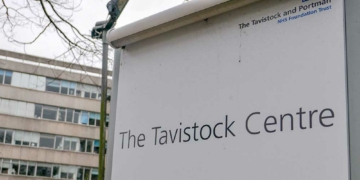The cosmetic retailer Lush reversed a decision to fund two lesbian groups on the grounds that they were “anti-trans” and it feared a backlash by trans activists, Lesbian and Gay News has learned.
Lush has a fund called the Charity Pot, which it draws on to provide grants to worthy causes in three areas: animal rights, the environment and human rights. Each area has a dedicated funding panel that makes decisions on funding applications for specific projects. Grants can range from £100 to a maximum of £10,000, but most are in the range of £2k-4k.
In July 2019, the human rights funding panel considered separate applications from two lesbian groups: the Lesbian Rights Alliance (LRA) and Mayday4Women. A whistleblower who sat on the five-strong funding panel, but who wishes to remain anonymous, said that the panel had never previously received applications from lesbian-only groups.
Both applications, she said, were “superb” and “focused on supporting young lesbians but doing it in completely different ways.” The LRA application requested funding for its Labrys project to create a networking group in London for young lesbians, while the Mayday4Women application wanted to develop resources “to create an online young lesbian culture”. Both applications, the whistleblower said, referred to “the decimation of lesbian culture, with younger lesbians in particular feeling there was no social scene for them.” She added that neither application mentioned the transgender issue, and exclusively focused on supporting young lesbians.
The funding panel unanimously approved grants of £3k each and approached the referees each had provided. Shortly after the decision was made, however, panel members received an email from the manager of the team administering the funds stating that Lush’s ethics director wanted the funding panel to reconsider the applications. It stated that the groups had positioned themselves as “anti-trans” and that a decision to fund them would be badly received by Lush staff, Lush customers and the LGBT press.
When the whistleblower asked why the groups were considered “anti-trans”, the team manager referred to the “Get The L Out” protests at the London Pride march in 2018 when lesbians peacefully interrupted the march with banners saying “lesbian = female homosexual” and “lesbian not queer”. The whistleblower told Lesbian and Gay News that these women were simply defending their sexual boundaries.
“Lush is alienating its core female market by refusing to stand up for women’s rights and for being too scared to support proud lesbians.”
The funding panel then met again to consider the applications and reversed its original decision to fund the groups, with only the whistleblower dissenting from the decision which she called “utterly shameful”.
She described the reversal as “a textbook example of how capitulating to bullies is the coward’s way out. Lush is alienating its core female market by refusing to stand up for women’s rights and for being too scared to support proud lesbians.”
Both Mayday4Women and the LRA received generic emails telling them that their applications for funding had been unsuccessful. Lynne Harne, who co-founded the LRA, emailed Lush three times asking for specific reasons for the rejection: “They just kept on saying the same thing over and over again… And it felt like banging your head against a brick wall that we weren’t going to make any progress with them.”
Harne said she was “absolutely furious” at the discovery that the application had been turned down because of fear of the response from trans activists. The organisation, she said, had “been captured by the trans agenda”. In response to the suggestion that LRA was “anti-trans”, she said: “The fact is that any young female women who are same-sex attracted and call themselves lesbians are regarded as anti-trans by the trans lobby. Ironically, it is only trans identified males – that is, trans women – that are allowed to call themselves lesbians.”
After receiving the rejection email, the LRA launched a crowdfunder, which succeeded in raising £3,700 for the Labrys project. The initial launch has been delayed because of the pandemic, but the youth group will be open to young lesbians aged 16 and over in London next year, and already has a website, Positively Lesbian.
Harne said that the group was much needed because there was still a stigma attached to being lesbian, and many felt they couldn’t come out to their parents. Young lesbians, she added, were “desperately searching to know that there are other young lesbians like themselves. They need to be supported in being lesbian, but online networks are really not enough – they want physical contact and to be able to meet socially.”
Lush has funded a number of trans groups, and its Paddington outlet was recently the subject of controversy when it introduced a service allowing young girls to collect chest binders in store.
When approached for comment, a Lush spokesperson responded: “Our Charity Pot application process has always been confidential, for the safety and privacy of the applicants and for the impartiality and independence of the decision-making process – so we are unable to talk about any details pertaining to applications and grants.”
Report by Kim Thomas.
Photo: Nathaniel Noir/Alamy Stock Photo
























Comments
No comments yet, be the first to leave a comment.